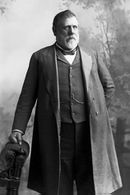1902 New Zealand general election
|
||||||||||||||||||||||||||||||||||
|
|
||||||||||||||||||||||||||||||||||
|
All 80 seats in the New Zealand House of Representatives 41 seats were needed for a majority |
||||||||||||||||||||||||||||||||||
|---|---|---|---|---|---|---|---|---|---|---|---|---|---|---|---|---|---|---|---|---|---|---|---|---|---|---|---|---|---|---|---|---|---|---|
| Turnout | 76.7% | |||||||||||||||||||||||||||||||||
|
||||||||||||||||||||||||||||||||||
|
||||||||||||||||||||||||||||||||||
The New Zealand general election of 1902 was held on Tuesday, 25 November in the general electorates, and on Monday, 22 December in the Māori electorates to elect a total of 80 MPs to the 15th session of the New Zealand Parliament. A total number of 415,789 (76.7%) voters turned out to vote.[1]
The Rev Frank Isitt was nominated as the Prohibitionist candidate for ten separate electorates, and came second in eight. Another candidate, D Whyte, was nominated for two. Both men stood to ensure that a local liquor licensing poll was held in each electorate for which they were nominated.
1902 electoral redistribution
The Representation Act 1900 had increased the membership of the House of Representatives from general electorates 70 to 76, and this was implemented through the 1902 electoral redistribution. In 1902, changes to the country quota affected the three-member electorates in the four main centres. The tolerance between electorates was increased to ±1,250 so that the Representation Commissions (since 1896, there had been separate commissions for the North and South Islands) could take greater account of communities of interest. These changes proved very disruptive to existing boundaries.[2] Six electorates were established for the first time: Courtenay, Newtown, Grey Lynn , Hurunui, Oroua, and Kaipara. Two electorates that previously existed were re-established: Mount Ida and Hutt.[3]
This boundary redistribution resulted in the abolition of three electorates:[3]
- Ashley, held by Richard Meredith
- Suburbs of Wellington, held by Thomas Wilford
- Waihemo, held by Thomas Mackenzie
Results
Frank Isitt, a Methodist minister, stood in ten seats as a Prohibition candidate, and came second in eight.
The following are the results of the 1902 general election:
Key
Liberal Opposition Independent Liberal Liberal-Labour Independent
| Electorate | Incumbent | Winner | Majority | Runner up | |||
|---|---|---|---|---|---|---|---|
| General electorates | |||||||
| Ashburton | John McLachlan | 439 | John Studholme | ||||
| Auckland, City of | William Joseph Napier | Alfred Kidd | 1,440 | William Richardson | |||
| Joseph Witheford | 938 | ||||||
| George Fowlds | Frederick Baume | 94 | |||||
| Chalmers | (new electorate) | Edmund Allen | 612 | John White | |||
| Egmont | Walter Symes | William Thomas Jennings | 15 | Charles Leech[5] | |||
| Napier | Alfred Fraser | 1,490 | Richard Joseph Eames[6] | ||||
| Oamaru | Thomas Duncan | 880 | John Marshall Brown[7] | ||||
| Waipawa | Charles Hall | 1,568 | James Taylor | ||||
| Waitemata | Richard Monk | Ewen Alison | 714 | Alexander John Hatfield[8] | |||
| Wellington, City of | John Hutcheson | John Aitken | 1,504 | Patrick O'Regan | |||
| Arthur Atkinson | John Duthie | 582 | |||||
| George Fisher | 381 | ||||||
| Westland | Richard Seddon | Frank Isitt | |||||
| Māori electorates | |||||||
| Eastern Maori | Wi Pere | Pirimi Mataiawhea | |||||
| Northern Maori | Hone Heke | Hāmiora Mangakāhia | |||||
| Southern Maori | Tame Parata | Hone Taare Tikao | |||||
| Western Maori | Henare Kaihau | 2,370 | Ngarangi Katitia | ||||
Notes
- ↑ Lua error in package.lua at line 80: module 'strict' not found.
- ↑ McRobie 1989, pp. 67f.
- ↑ 3.0 3.1 McRobie 1989, pp. 63–68.
- ↑ Lua error in package.lua at line 80: module 'strict' not found.
- ↑ Lua error in package.lua at line 80: module 'strict' not found.
- ↑ Lua error in package.lua at line 80: module 'strict' not found.
- ↑ Lua error in package.lua at line 80: module 'strict' not found.
- ↑ Lua error in package.lua at line 80: module 'strict' not found.
References
- Lua error in package.lua at line 80: module 'strict' not found.
- Lua error in package.lua at line 80: module 'strict' not found.

